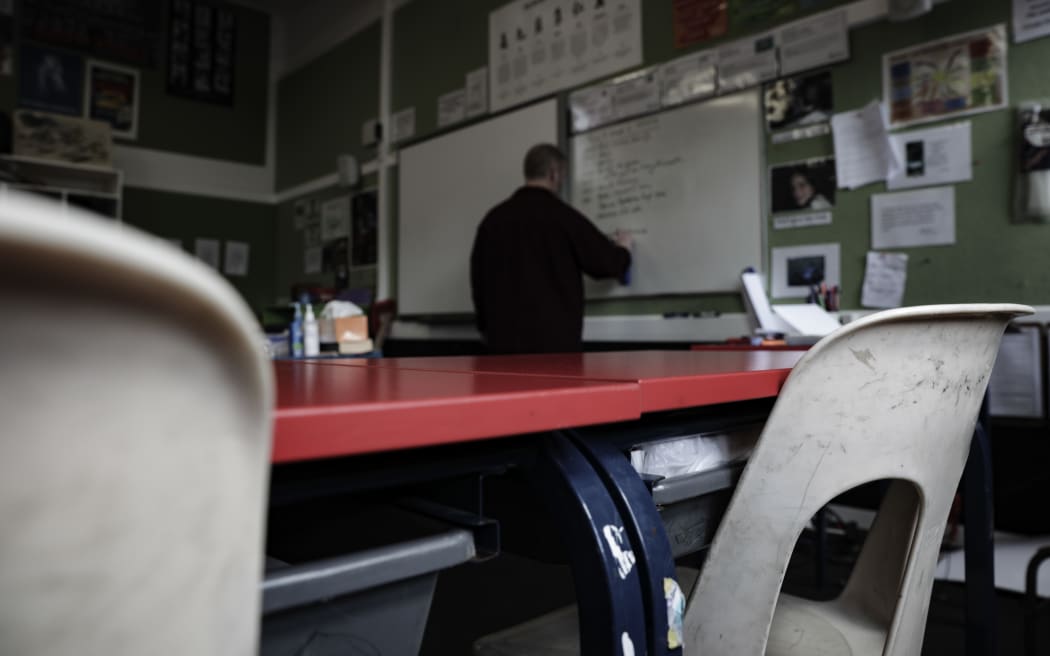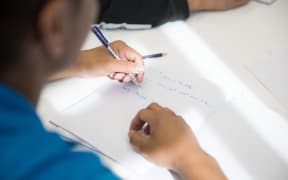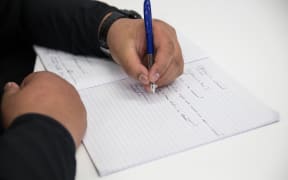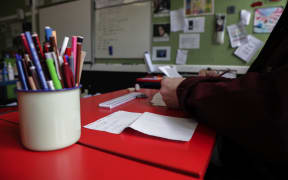
Official figures show secondary schools are relying more than ever on foreign-trained teachers and teachers over the age of 65. Photo: RNZ / Richard Tindiller
Secondary school principals warn they are struggling to find enough good teachers to staff their classrooms next year.
A surge of teenagers arriving from overseas and falling teacher trainee numbers are putting pressure on teacher recruitment.
Official figures show secondary schools are relying more than ever on foreign-trained teachers and teachers over the age of 65.
Principals have complained about teacher shortages for several years, but Northcote College principal Vicki Barrie said the situation was definitely worse than ever.
She said relying on foreign teachers was a temporary solution and more needed to be done to encourage young people finishing their degrees to study to become secondary teachers.
She said since 2010 the number of secondary teaching students had halved, with just 685 enrolled in April this year.
"We're asking people who have got lots of other multiple, positive options to consider another year as a student, another full-time year training to be a teacher and then some pretty modest salaries once you are trained," Barrie said.
"We have to offer graduates something more attractive. Something like no fees for your year of teacher training, maybe income for the year of teacher training and then maybe something like 'stay for two years and we'll write off your student loan'."
Barrie said a recent SPANZ survey found 16 percent of principals said they had to cancel classes or subjects because they did not have enough teachers.
"I've had to limit numbers in technology classes, it's not that we're not offering the subject at all, but at different year levels there are particular constraints because we're short of a teacher," Barrie said, adding that the situation would be resolved when a former teacher returned to the school next year.
The full effect of the teacher shortage was masked by teachers' willingness to cover classes out of goodwill to the school, Barrie said.
"On more than one occasion when I haven't been able to fill a vacancy in technology or maths, someone from another department has agreed to teach beyond what they're meant to teach in terms of hours to cover that class because they want to do the right thing for students and for the community."
Last year more than 7000 foreign-trained teachers were working in schools, the highest figure ever, and more than 4000 of them were in secondary schools - meaning 14 percent of secondary teachers were overseas-trained.
Kaitaia College principal Louise Anaru said she had hired foreign teachers for the first time for her school of 1000 students and about 70 teachers.
"We've just employed eight overseas teachers so our maths department is fully staffed and science and we have about another four to five yet to appoint," she said.
Anaru said the school had not deliberately sought foreign teachers, but they were the people that responded to its vacancy advertisements in the Education Gazette, the Ministry of Education's magazine.
She said staffing Northland schools had become more challenging every year and the school was trying to develop its own teachers by encouraging support staff, such as teacher aides, to enrol in a Bachelor of Education with the University of Waikato. Eight staff were in the programme this year and a further nine had signed up to start next year, she said.
"They carry on working at the school, they can still earn a wage but also study at the same time. They don't have to leave their families, homes, other part-time jobs, and because they're also members of the community, they're often parents of the school, they have a real connection to our students and community."
Aorere College principal Leanne Webb said she nearly had enough staff for next year, but was about to give up on finding a social sciences teacher after advertising three times without success.
"I'm at the point now where I have to go, 'Okay, I can't get a social science teacher - so who am I going to move around the school and ask them to teach social science and what will the consequences be? Will I have to collapse some classes in some subject areas because I haven't got enough staff?'"
Webb said hiring teachers was a lot harder than it used to be.
"It used to be that it was difficult to get a maths teacher or it was difficult to get a physics teacher - now you can't get a PE teacher. What are you supposed to do? When it's the core subjects and they're compulsory and you can't get a teacher, that then becomes really difficult. That's when your class numbers start climbing up because you haven't got enough teachers to cover a bigger range of smaller classes.
"Things are pretty dire. I've just actually come from a meeting with principals where we were sitting around a table and people were going, 'Oh, I've got one of yours,' and then, 'I've got one of yours'. We're cannibalising each other."
Webb said it was especially hard to find staff for leadership roles because the teaching profession was "hollowed out" with relatively few teachers aged 30-50.
"They're just not there, and that's a real concern."
Tthough her school had just enough teachers for next year, Webb said many were first-year teachers or were training on-the-job through the University of Waikato or Teach First - and that put more pressure on the school to provide mentoring and support.
Webb said secondary teaching was no longer a choice for 21-year-olds finishing their first degree, but more of a career change option for people in their late 20s or 30s.
"It's an enormous commitment to leave your job and then train to be a teacher. It needs to be easier ... I guess you need to pay people to train."
Learning on the job
Studying a Bachelor of Teaching while working at Kaitaia College was like a dream come true, Wiremu Wilson-Diamond said.
Wilson-Diamond, an artist with experience working with young people, was already the guidance dean and a teacher of technology and design at the college for four years under a Limited Authority to Teach - a Teaching Council permission allowing people with no teaching qualifications to teach.
He told RNZ the opportunity to study to become a teacher through the University of Waikato was too good to pass up, though it was also the hardest thing he had ever done.
He said the Bachelor of Teaching was a primary school teaching qualification and its focus on student wellbeing was perfect for his guidance role.
"Today we're dealing with whānau who have been traumatised by education themselves, who don't recognise it, but that has created homes that no longer realise the importance of education and knowledge - and it's not happening in their lounges is what I've noticed the most."
Wilson-Diamond said the study was also equipping him with the language and knowledge to better engage in staffroom discussions about student learning and behaviour.
He said giving people in Te Tai Tokerau the opportunity to gain a teaching qualification on the job was incredible.
"It's unheard of. I see all of our support workers, our teacher aides ... they're not acknowledged for the level of hard work that these people they're putting in."
Wilson-Diamond said his study was also good for his three children.
"One of the things I love is that they're watching me do this. I'm making tertiary knowledge normal in my house. My oldest daughter is so interested in what I'm doing and how I'm applying myself."






